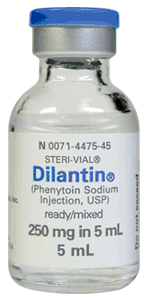Top Class Actions’s website and social media posts use affiliate links. If you make a purchase using such links, we may receive a commission, but it will not result in any additional charges to you. Please review our Affiliate Link Disclosure for more information.

However, like many drugs, Dilantin side effects have been known to occur, including a serious and often fatal allergic skin reaction known as Stevens Johnson Syndrome (SJS).
What is Stevens Johnson Syndrome?
Stevens Johnson Syndrome
is typically caused by a severe allergic reaction to various types of medications and has recently been reported as a Dilantin skin side effect. Dilantin SJS symptoms usually begin with a skin rash that can lead to blistering, severe peeling, and open sores. If an SJS rash is not diagnosed in time, and condition may become life-threatening. SJS can be caused by almost any medication, including antibiotics, anticonvulsants, sedatives, and painkillers. Some SJS symptoms can include:
- Flu-like symptoms, such as fever, sore throat, cough, burning eyes
- Facial swelling
- Tongue swelling
- Hives
- Skin pain
- A red or purple skin rash that spreads within hours to days
- Blisters on your skin and the mucous membranes of your mouth, nose, eyes and genitals
- Skin shedding or sloughing
In more severe Dilantin SJS cases, the skin reaction is known as Toxic Epidermal Necrolysis, or TEN. Stevens Johnson Syndrome from Dilantin often results in hospitalization, necessitating ICU and/or burn ward treatment, and has been fatal in some cases. Some SJS Dilantin side effects a patient may exhibit can include:
- Rash, blisters or red spots on the skin
- Blisters in the mouth, eyes, ears, nose or genital area
- Swelling of the eyelids
- Fever or flu-like symptoms
Dilantin Stevens Johnson Syndrome side effects usually begin with a a fever, sore throat and fatigue. Ulcers and other lesions may also begin to appear in the skin, often in the mouth and lips or in the genital regions. A rash or lesions typically develop on the face, trunk, arms, legs and soles of the feet. These Dilantin SJS skin blisters are extremely painful and debilitating.
Although many medications can cause SJS or TEN, Dilantin appears to increase the risk for patients, according to recent studies.
Study Links Dilantin SJS
In a Dilantin SJS study published in the Journal of the American Medical Association (JAMA), researchers stated that they have isolated and identified a CYP2 gene variant that can determine if use of Dilantin cause patients to develop Stevens Johnson Syndrome.
The study involved 105 cases from 2002 to 2014 involving patients who took Dilantin and developed adverse reactions, such as Stevens Johnson Syndrome. Researchers also looked at 130 patients who tolerated Dilantin well and a control of 3,655 subjects not on the drug from Taiwan, Japan, and Malaysia.
This Dilantin side effects study proposes possible links about the role of genetics in determining a patient’s risk of SJS, since patients with certain variants of the CYP2C gene appeared to be more likely to suffer severe skin reactions when taking Dilantin.
Dilantin SJS Lawsuits
Dilantin has been named in at least 100 lawsuits that claim the drug caused the serious and sometimes fatal SJS skin reaction. It is expected that hundreds more Dilantin SJS lawsuits could be filed in the future. Plaintiffs allege that Dilantin’s manufacturer and seller, Pfizer, was aware of the dangers of these Dilantin side effects, but failed to inform patients or the medical community of the SJS risks.
Do YOU have a legal claim? Fill out the form on this page now for a free, immediate, and confidential case evaluation. The SJS attorneys who work with Top Class Actions will contact you if you qualify to let you know if an individual lawsuit or Dilantin class action lawsuit is best for you. [In general, Dilantin lawsuits are filed individually by each plaintiff and are not class actions.] Hurry — statutes of limitations may apply.
ATTORNEY ADVERTISING
Top Class Actions is a Proud Member of the American Bar Association
LEGAL INFORMATION IS NOT LEGAL ADVICE
Top Class Actions Legal Statement
©2008 – 2024 Top Class Actions® LLC
Various Trademarks held by their respective owners
This website is not intended for viewing or usage by European Union citizens.
Get Help – It’s Free
Help for Victims of Stevens Johnson Syndrome
If you or a loved one were diagnosed with Stevens Johnson Syndrome (SJS) or toxic epidermal necrolysis (TEN) after taking a prescribed or over-the-counter medication, you may be eligible to take legal action against the drug’s manufacturer. Filing an SJS lawsuit or class action lawsuit may help you obtain compensation for medical bills, pain and suffering, and other damages. Obtain a free and confidential review of your case by filling out the form below.
An attorney will contact you if you qualify to discuss the details of your potential case at no charge to you.
Oops! We could not locate your form.












